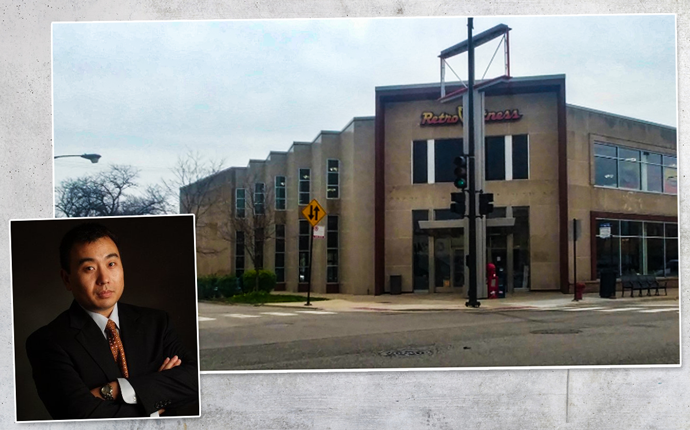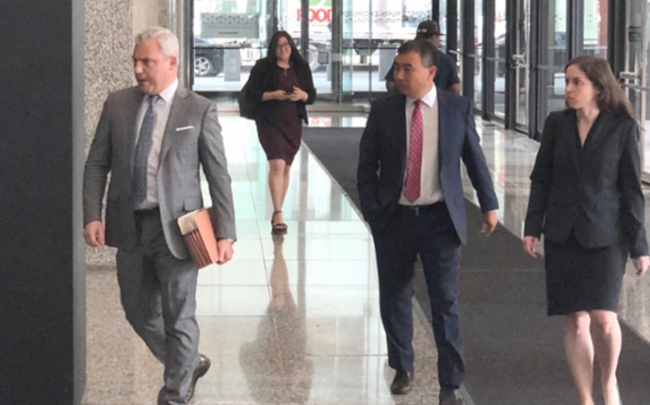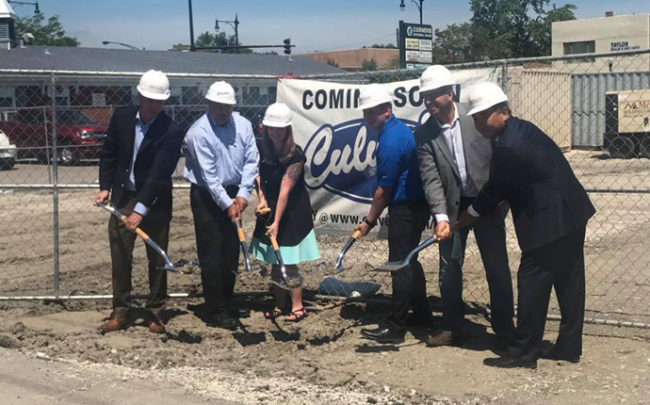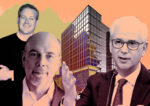Trending
“Such a beautiful sign:” How a developer found his way into latest City Hall corruption scandal
Cui has been involved in local real estate for at least 16 years, in part by franchising new locations of a NJ-based gym

Before Charles Cui was swept up in the latest City Hall corruption scandal, his name did not register far outside the small patchwork of properties he owns on the city’s Northwest Side and suburbs.
But that was before he turned to veteran Alderman Ed Burke (14th) to help him out of a leasing snafu, according to federal investigators.
The developer appeared in court Tuesday alongside Burke and Burke’s deputy, Peter Andrews, for a preliminary hearing to let federal prosecutors spell out their plan for sharing evidence with defense attorneys. U.S. Judge Robert Dow set the next hearing for Oct. 8, laying the groundwork for a marathon legal battle as Burke serves his 13th term as alderman.

Charles Cui and his attorneys walking out of Dirksen federal courthouse on July 2, 2019
The episode described in a federal indictment dates to May 2017, when city officials denied Cui’s application to erect a free-standing sign for Binny’s Beverage Depot when the chain was looking to open in the Portage Park building Cui owns. Then, three months later, Cui entered into a lease with Binny’s that promised reduced rent if it did not get to use to the sign.
In August, the landlord decided to try to enlist Burke’s help.
“Can I have [Burke] handle … property tax appeal for me, at least for this year?” Cui wrote in an email to his property tax attorney in 2017, according to the indictment.
“I need [Burke’s] help for my zoning etc for my project,” Cui wrote to his attorney. “He is a powerful broker in City Hall, and I need him now.”
Cui, who also is an immigration attorney and co-founder of a law firm based in his Portage Park building, is charged with one count of bribery, one count of making a false statement to the FBI, and two counts of using interstate commerce to facilitate bribery. He pleaded not guilty to all charges.
Cui and his attorneys did not respond to a request for comment for this story.
The attorney’s side business as a real estate owner and developer stretches back more than 15 years, and he supplemented his property income by franchising new locations of a New Jersey-based gym chain.
It all led to Cui’s biggest project yet: Redeveloping the vacant former bank building at 4901 West Irving Park Road, in the heart of the city’s Six Corners Shopping District.
“It is such a beautiful sign”
When Cui bought the property in 2013, it was overlooked by an abandoned pole sign left outside the building from when it had operated as a Bank of America branch years earlier.
Cui said his 2017 lease with Binny’s stipulated a $750,000 rent discount if the tenant couldn’t make use of the sign, writing to Burke that Binny’s “really needs it, otherwise they will either cancel the lease, or ask for a significant rent reduction,” according to the indictment.
But the pole had been left over from an era long before the street adopted a pedestrian zoning designation, rendering use of the sign illegal, according to a former city official who was involved in permitting discussions for the Binny’s and spoke to The Real Deal on condition of anonymity.
“We were trying to find other solutions that would comply with the zoning, because it was pretty clear in the street designation that a pole sign was not going to fly,” the official said. “So if he was going to lose all this money after the fact, why would he enter into this agreement?”
Representatives of Binny’s did not respond to requests for comment.
In July 2017, when a reporter at DNAinfo Chicago emailed Cui to ask about the opening date of the Binny’s, Cui blamed the sign for its late debut, replying the store had “a little bit [sic] signage permit delay from the city.”
About a month later, Cui emailed Burke to ask for his help getting the permit approved.
“My tenant … applied to reuse the existing pole sign in front of the building, but was denied by zoning, stating the pole sign was abandoned for several years, and now is illegal,” Cui wrote. “Can you look into the matter, and advise how to proceed? … It is such a beautiful sign, it is becoming a landmark for the community and it costs lots of money to remove it.”
But the pole was ultimately removed, and Binny’s added a smaller sign onto the side of the building.
Origins in the suburbs
Cui’s real estate career dates to at least 2003, when he paid about $354,000 to buy a small retail property at 1320 Waukegan Road in north suburban Glenview, according to Cook County property records.
Three years later, he paid $353,000 to buy a four-unit apartment building at 830 West 35th Place, records show. He was sued by the city three times for building code violations on the property, in 2006, 2009 and 2010, and each suit was dismissed after Cui brought the building up to code.
The final city lawsuit was dismissed in 2016, days before he closed on a sale of the property for $399,000.
Cui also owns a strip mall at the corner of North Avenue and Schmale Road in west suburban Carol Stream, where in 2013 he opened the first Chicago-area location of New Jersey-based Retro Fitness.
At the time, he told Patch the gym was “just the beginning of the Retro Fitness expansion in the Chicagoland area,” with plans to open at least three more locations.
That year, Cui also was sued for breach of contract by Avalon Realty, which accused him of “disregarding, misquoting and misinterpreting” its listing agreement when the commercial brokerage asked him for payment. The lawsuit was settled for an undisclosed amount in 2015.
Also in 2013, Cui paid about $2.9 million to buy the former bank building at 4901 West Irving in Portage Park, plus an adjacent lot. He moved his law practice into the top floor of the building.
After four years and an extensive renovation, the property began to come alive in summer 2017. That’s when Cui opened the city’s first Retro Fitness location in the basement and second floor of the building, and he leased Binny’s to its entire first floor. Cui also posed for a photo with local officials in a July groundbreaking ceremony for a new Culver’s restaurant in the vacant lot next door, which became one of the Wisconsin-based burger chain’s first Chicago outposts.

Cui (far right) and local officials breaking ground on a new Culver’s on Cui’s property, 4943 West Irving Park Road (Credit: Twitter)
But other elements of Cui’s vision for the site never materialized — most notably a community theater, for which he struck a deal with the city in 2016 to tap $2 million in tax increment financing.
The theater was never built, and Cui never saw any payout from the TIF district, officials said. Cui also said he would fill an empty storefront on the property with an Elly’s Pancake House restaurant, and that space remains vacant two years later.
In August 2017, Cui refinanced the re-tooled property with a $3.6 million loan from the International Bank of Chicago, records show.
About two weeks later, he emailed Burke about the pole sign, calling it a “legal matter that may need your representation,” according to prosecutors. He also emailed his current property tax attorney to say “I need [Burke’s] favor for my TIF money,” the indictment continued.
Cui’s direct appeal for help did not surprise one person with knowledge of his Portage Park real estate ventures, and spoke with The Real Deal on condition of anonymity.
“He was not very discrete … he put a lot of things in writing,” the person said. “And the way he wrote was not very diplomatic.”
Cui developed a reputation in the neighborhood for stepping over others to get what he wanted, the person said.
“I think he’s just a really wealthy guy who believes the rules don’t apply to him,” the person continued. “He thought he could get around things like permitting and zoning by using money or aligning himself with whomever may be able to help him.”




